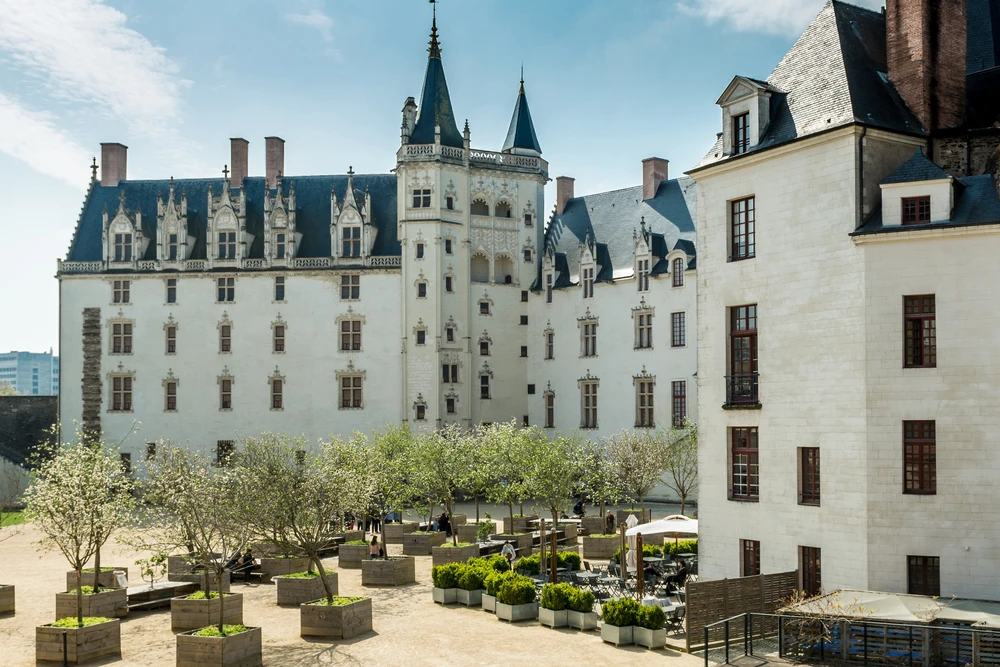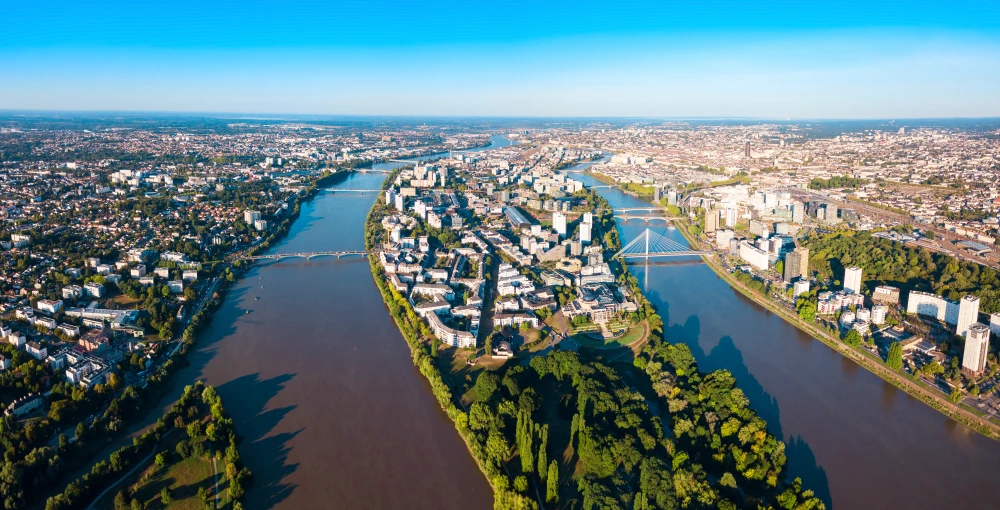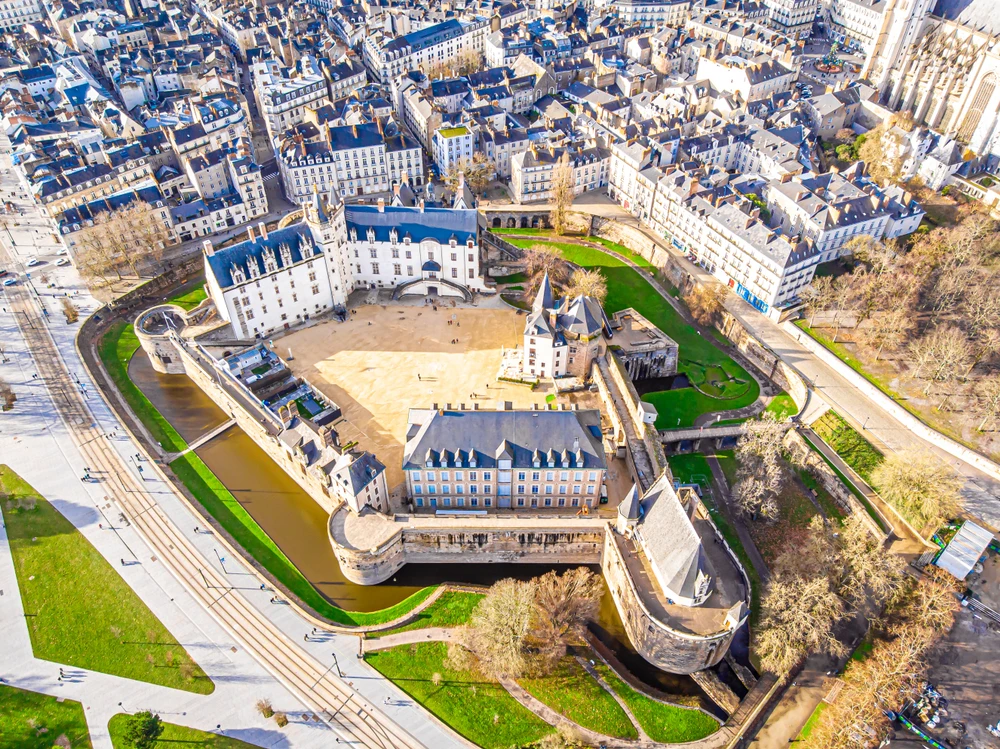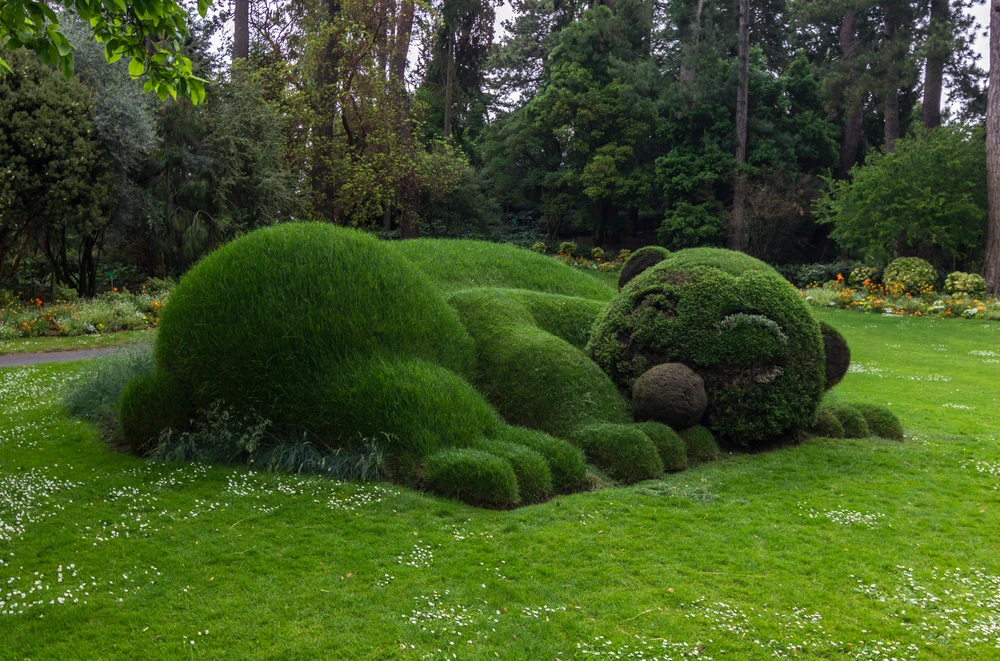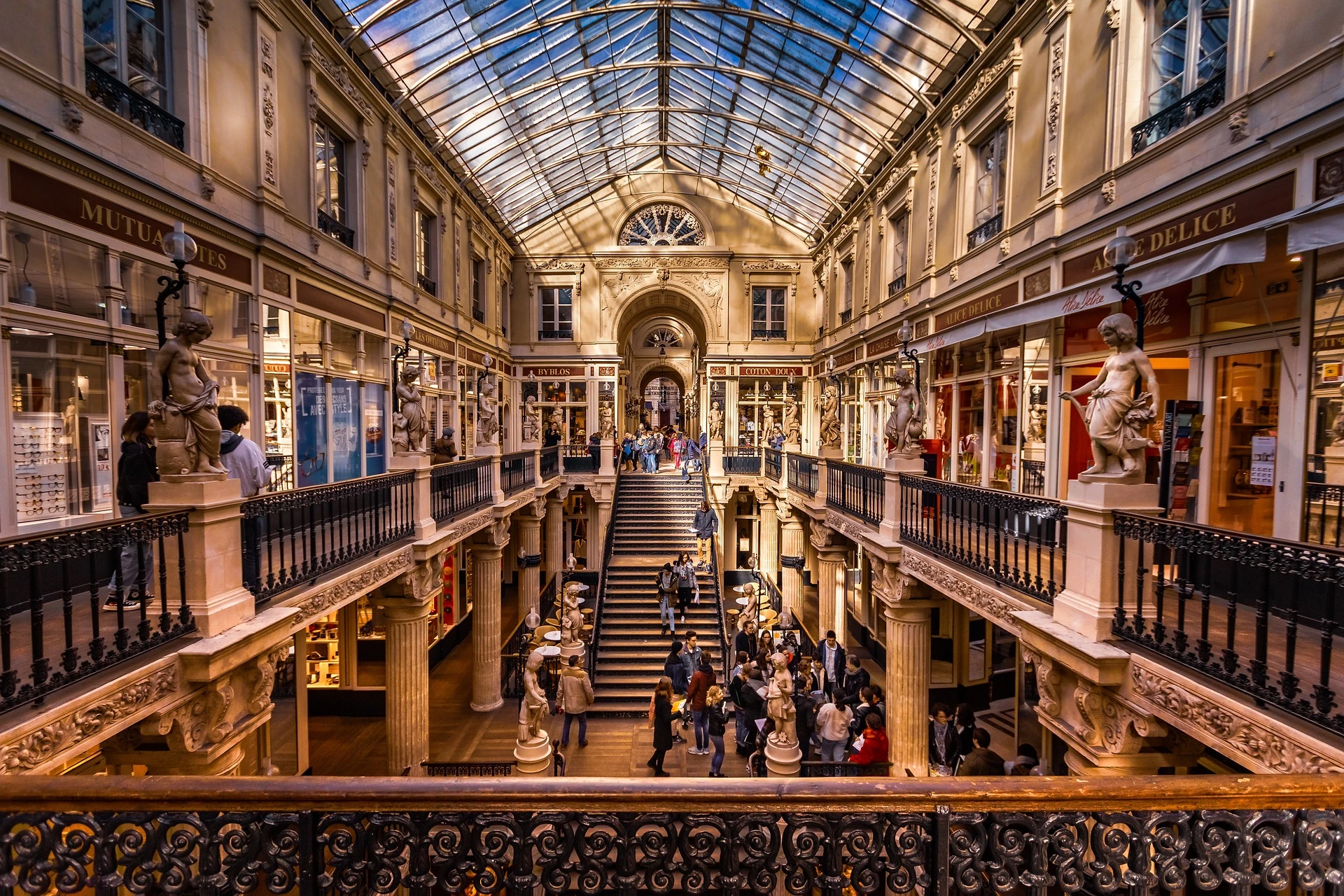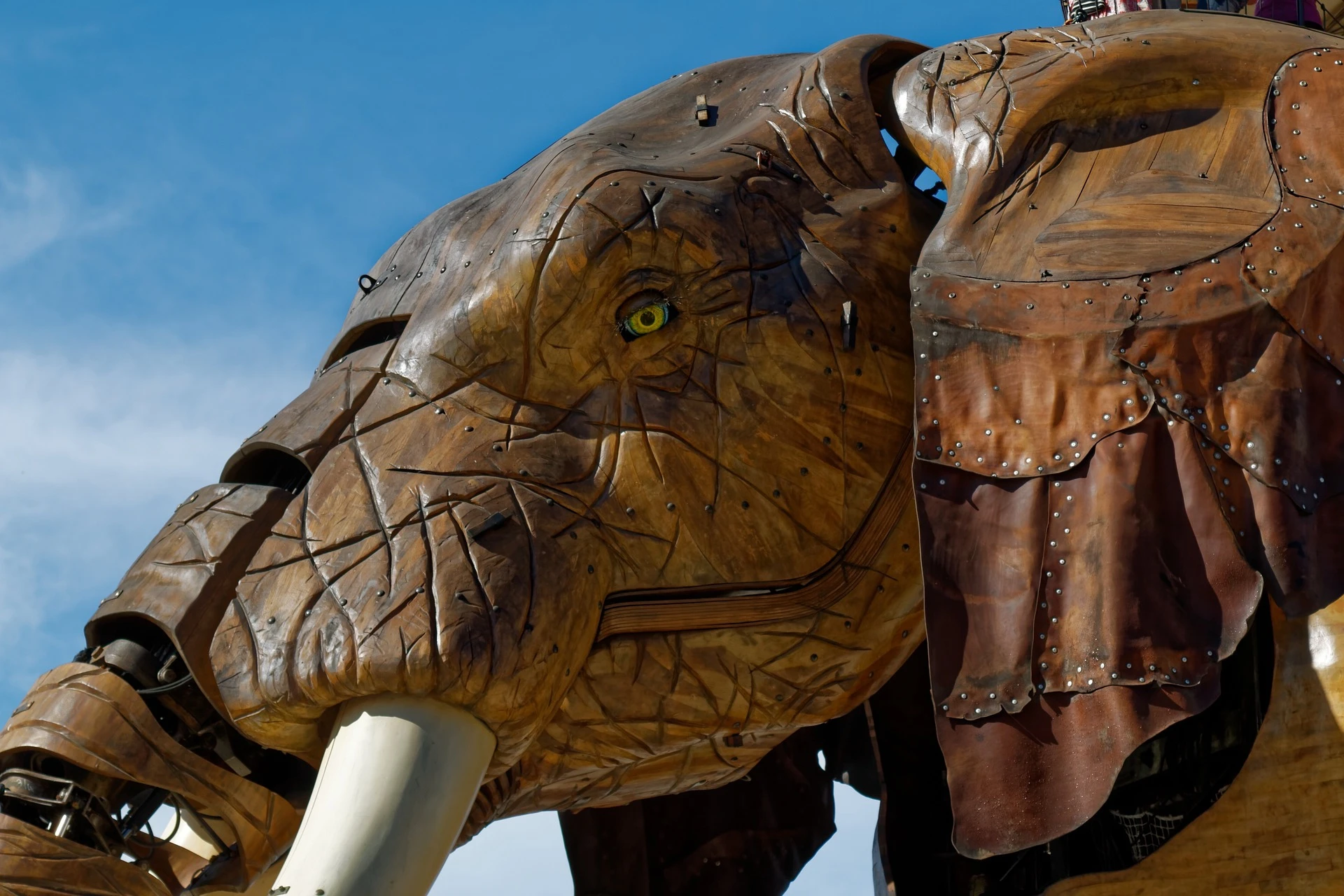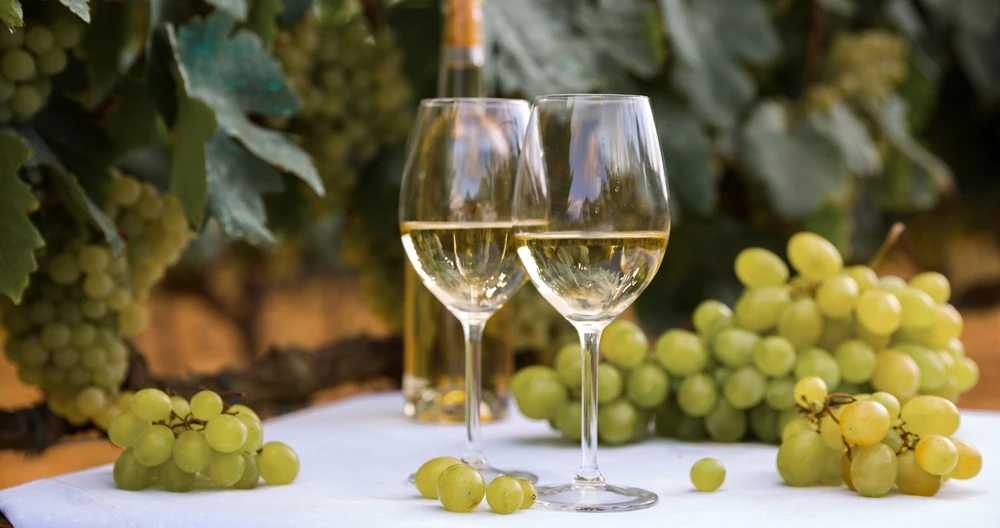Nantes is a perpetual encounter. It always has been.
Rencontre Between Brittany and the Pays de la Loire, because even though it's the capital of the Pays de la Loire, it's also where the palace of the sovereign dukes of Brittany is located. This is where Duchess Anne de Bretagne was born. The only woman in history to be twice Queen of France, she did everything in her power to preserve the independence of a duchy that even Charlemagne never conquered. Her father François II left the splendid château des ducs. It's a pleasure to visit this beautiful white-stone site, which always reminds us a little of fairytale castles, with its ramparts, but also those delicate white stones and tall mullioned windows. A blend of Middle Ages and Renaissance, it's a reminder that Nantes is all about heritage meets boldness.
The Château de Nantes inner courtyard side photo by kamira777/Shutterstock.com
This is still alive and well with the famous "folles journées de Nantes" or during the "Voyage à Nantes" . Events that offer invention, art and parades not far from the cathedral with the lieu unique or the creative district that brings together the creative imaginative, with over forty works located in the streets.
Nantes is where youth and knowledge meet, as it is a city of students and researchers. It's also a meeting place for the Loire and the sea, as its harbor overlooks the immense river and leads to the open sea. It's hardly surprising, then, that France has made this one of its most beautiful vistas of the world, through the trade conducted by these immense sailing ships, which were armed from Nantes and sailed the seas of the globe to sell, buy and trade. Not always in a good way, as many of them were used to transport slaves to the Americas;
The Loire divides into several arms and passes through Nantesphoto by saiko3p/Shutterstock.com
In Nantes, where the dying Loire passes, the sea is so close that seagulls don't hesitate to perform acrobatics around the famous pont de Cheviré or above the Beaujoire stadium, which has seen the exploits of the canaris, the soccer team, and some of the biggest concerts of the 20th century. If the soul chooses where it is incarnated, we wish it to be born in Nantes, an open and curious city, a city of daring and France's gateway to the immensity of the Ocean...
Top 5 things to see in Nantes
1 the Castle of the Dukes of Brittany in Nantes
Aerial view of Nantes castle photo by Alexey Fedorenko/Shutterstock
the oldest parts date back to the 14th century when the Dukes of Brittany reinforced this castle, which served to protect one of their capital cities. The Tour du Vieux Donjon (Old Keep Tower) dates from the Middle Ages, and was used by Gilles de Rais, Joan of Arc's companion and serial killer, during his trial. Most of the château was built during the Renaissance, notably the superb facades with their typical mullioned windows. Inside, you'll find a museum dedicated to the history of Nantes, with over 1,000 works of art. The 500-metre walk along the ramparts is a great photo opportunity.
2 Nantes gardens:
Two sumptuous gardens make Nantes famous: le jardin des plantes and its 7 hectares make it one of the 4 largest plant gardens in France. There are 800 m2 of greenhouses, over 50,000 flowers and, on hot summer days, the fountains are great for cooling off. Further on, le jardin japonisant de l'Ile de Versaillesand a little treasure with its rockeries and waterfalls and a pretty house on the Erdre that presents local flora and fauna. Leaving the Ile de Versailles garden, don't hesitate to stroll along the banks of the Erdre to discover one of the rivers that François 1er de France most appreciated, with lovely houses and manor houses to discover.
Nantes Botanical Garden photo by Julen Arabaolaza/Shutterstock.com
3 Nantes, city of commerce
Passage Pommeraye and Tour LU in Nantes, Belle Époque architecture and historic site of Nantes commerce, a heritage must-see. Image by edmondlafoto de Pixabay
The city center is well worth a visit, with two sites that remind us that Nantes has long been one of France's leading commercial cities. La Tour LU and its typical Belle Epoque architecture reminds us that it was here that the famous little LU butters were born, and that they were made until before the war at the foot of the castle of the Dukes of Lorraine. Further on, in the heart of town, the Passage Pommeraye connects Place Royale to Place Graslin, and offers a magnificent backdrop with its beautiful ironwork and beautifully decorated facades.
4 Saint Peter and Saint Paul Cathedral:
It took 457 years to build this magnificent cathedral in beautiful white stone, which erects its two towers from the top of which platforms provide views over the city. Damaged by the bombing of Nantes in 1944, by a roof fire in 1972 and more recently by a fire in 2020, it is nevertheless constantly being reborn and is well worth a visit;
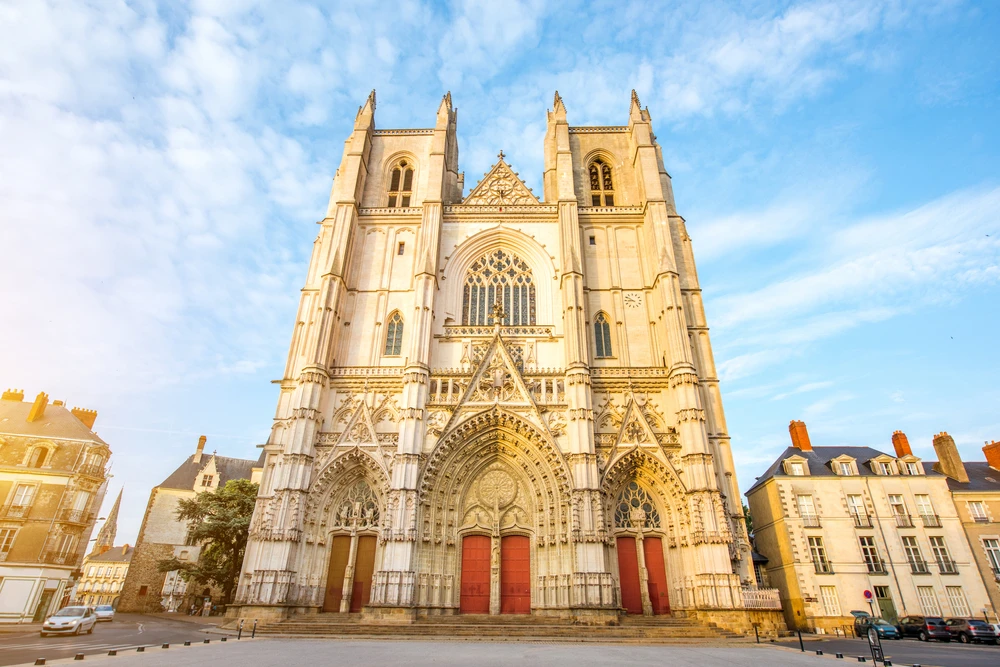
Nantes Cathedral image by RossHelen/Shutterstock.com
5 Les machines de l'Ile de Nantes
Image by Thierry Raimbault from Pixabay
On the island you can discover this amazing place of invention, inspired by Leonardo da Vinci and especially Jules Verne, who was born here in Nantes. The machines are inspired by animals, and can sometimes be seen in action. Between the heron tree and the giant 12-meter-high elephant: astonishment and sensations guaranteed.
But I could have told you about the Musée des beaux-arts de Nantes, ideally placed between the castle and the cathedral, or the Bouffay district, with its old houses, including the astonishing maison de l'Apothicaire and great little cafés or restaurants to sit around a table.
Gastronomy in Nantes :
The wine of Nantes is muscadetimage by CaftorRossHelen/Shutterstock.com
The most famous culinary specialty is undoubtedly le petit-beurre, a simple dry cake invented by Louis Lefèvre-Utile (creator of the LU brand) in 1886, it's greedy and full of symbols as it symbolizes time with its 4 ears (the 4 seasons), its 24 little holes (the 24 hours of a day), and its 52 "teeth" (for 52 weeks in the year). And Nantes is the heart of the vineyards that produce the famous muscadet, which can be tasted in many cafés across France, so fresh and lively is it from here.
Also to be enjoyed:
Les rigolettes nantaises, which take their name from "rigolette" the mischievous cat of confectioner Charles Bohu, who invented them in 1902. A typical candy with a shell that melts in the mouth and releases a kind of fruit jam. More "hard" than rigolettes are the berlingots nantais, with their typical pyramid shape, and whose recipe is said to have been given to a canteen-maid who had just given alms to a poor woman. A recipe that made her fortune. Last but not least, don't forget the gâteau Nantais, with its almond powder and hint of rum.
Where is Nantes ?
Nantes : 300 000 citizens, 50 kms from the Atlantic Ocean and 400 kms from Paris. There is the Nantes Attlantique airport with many international destinations. Paris is 4H00 by car and between 2H and 2H30 by TGV.
FAQ
What are the must-see attractions in Nantes?
The must-see attractions in Nantes include the Castle of the Dukes of Brittany, the gardens (including the botanical garden and Île de Versailles), Saint-Pierre and Saint-Paul Cathedral, the shopping district with the LU Tower and Passage Pommeraye, and the Machines de l'Île.
How do I get to Nantes from the Pays de la Loire or Brittany?
Nantes is accessible by TER or TGV train via the central station. By car, roads such as the N137, N176, and A11 motorway provide access to the city from neighboring regions.
Is there an admission fee to visit the ramparts of the Château des Ducs in Nantes?
Access to the ramparts (outer walls of the castle) is generally free; however, there may be a charge to visit the museum interiors and certain exhibitions.
When is the best time to visit Nantes?
The ideal time to visit Nantes is from May to September, when the gardens are in bloom and the weather is pleasant for strolling around the city.

